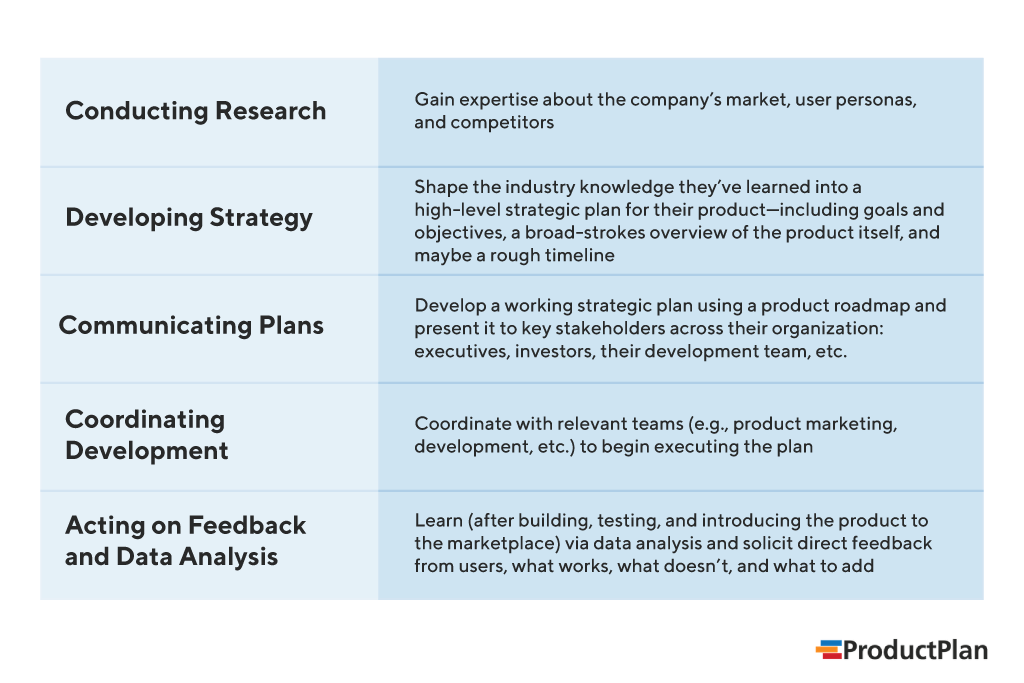What Is a Product Manager?
The role of Product Manager (PM) is a vital and pivotal position within many companies, and it’s often not well defined. While the responsibilities of PMs vary quite a bit across industries and businesses, all PMs drive the development of products and are ultimately responsible for those products’ success.
Think of PMs as information gatherers. They define the long-term strategic direction and product vision of their products through the lens of knowledge they acquire about:
- Their business’s strategic goals
- The market’s demands and opportunities
- The technological and financial resources available to them to make the product a reality
According to the education site Disciplined Agile Delivery, the PM role is “focused on the long-term vision for the product, on observing trends in the marketplace, on identifying new potential outcomes or themes to be supported by the product, on supporting the sales/adoption of the product, and on ensuring the product meets the needs of the value stream(s) the product is involved with.”
What Does a Product Manager Do?
The two primary responsibilities of PMs are to set the long-term vision and strategy for the company’s products and then communicate this strategy to all relevant participants and stakeholders. To accomplish this, PMs generally focus on the following:

Conveying a strategy and vision, along with specific plans and their rationale, is vital. PMs must build consensus, break down (or at least work across) organizational silos, and win over stakeholders to get their job done. More than other roles, product managers deal with the various personality types of individuals that can play a part in a product’s success and growth or its crash and failure.
Key Skills for a Product Manager
Product management requires a combination of specific hard skills and soft people skills to effectively shepherd a product through the various phases of its lifecycle.
Here are a few key skills every PM should have (or consciously cultivate):
- Product Development Processes: A concrete understanding of the role and product development processes and frameworks is essential. Before finessing the interpersonal dynamics of working with a product development team, product managers must be able to speak their language, comprehend the expectations, and know the scope of their job versus that of project managers, UX professionals, architects, and the like.
- Pricing Principles: Product managers also need a solid understanding of fundamental business and economic policies. Pricing often falls on their shoulders. If they’re unable to turn the underlying unit economics into a profitable and scalable business, they’ll have a pretty short career.
- Prioritization: Prioritization is at the core of product management. The most critical part of the job is to assess the relative value and impact of each potential feature, technical debt, project, and initiative, and create a coherent strategy. A cohesive strategy includes being able to say no when the time comes and recognizing the need for a pivot or strategic shift if applicable.
- Communication: On the softer side, communication lies at the heart of any successful product manager. They must be a cipher and be comfortable speaking with all sorts of people filling different roles. They speak with customers, internal teams, and stakeholders. Product managers must get along with engineers and relate to the perspectives of stakeholders.
Additional Resources for Product Managers
Here are a few of our favorite resources for cultivating excellence in the PM role:
- The Ultimate Guide to a Product Manager’s Job
- 4 Key Responsibilities of Outstanding Product Managers
- 7 Habits of Highly Effective Product Managers
- The Ultimate Guide to Product Management
- 5 Harsh Realities for Product Managers
- What Is the Product Manager Career Path?
- What Makes a Great Product Manager?
- 7 Product Management Lessons from Real Product Managers
Related terms: Technical Product Manager / Platform Product Manager / Product Development Manager / Product Owner / Product Leadership / Product Management Talent